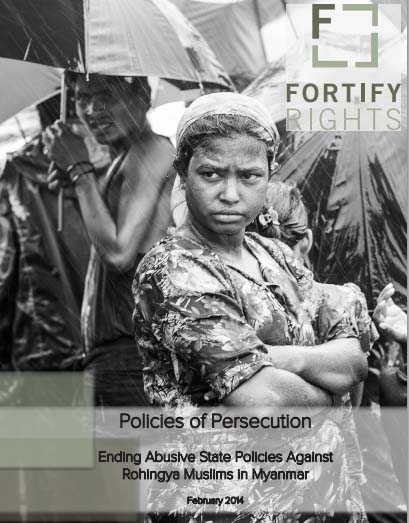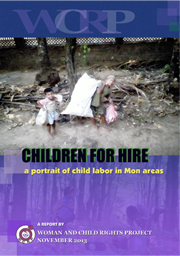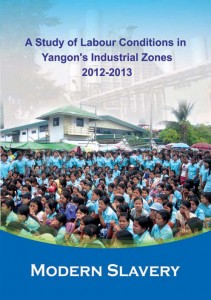Human Rights (383 found)
Briefing Paper on the Situation of Human Rights in Burma/Myanmar 25th Regular Session of the UN Human Rights Council
1.0 Introduction While acknowledging the positive developments that have occurred in some areas relating to human rights in Burma/Myanmar, in other areas, progress has been lacking, while in some others still, significant backsliding has taken place. The areas that have witnessed significant backsliding or lack of progress include: the continued criminalisation and harassment of political […]
• • •UN Human Rights Council Burma Resolution must not Drop Demands for Action
The content of the next United Nations Human Rights Council Resolution on Burma is currently being discussed by the European Union. Members of the European Burma Network call upon European Union members to ensure the Resolution continues to highlight ongoing human rights abuses in Burma, and continues to call for action by the government of Burma to end these abuses […]
• • •MYANMAR: ABOLISH ABUSIVE RESTRICTIONS & PRACTICES AGAINST ROHINGYA MUSLIMS
 The 79-page report, Policies of Persecution: Ending Abusive State Policies Against Rohingya Muslims in Myanmar, produced by Fortify Rights is based primarily on the analysis of 12 leaked official documents and a review of public records, as well as interviews with Rohingya and others in Myanmar and Thailand. The documents published in the report reveal restrictions that deny Rohingya basic human rights, including the rights to nondiscrimination, freedom of movement, marriage, family, health, and privacy. All of the restrictions and enforcement methods described in the report appear to be in effect at the time of writing.
The 79-page report, Policies of Persecution: Ending Abusive State Policies Against Rohingya Muslims in Myanmar, produced by Fortify Rights is based primarily on the analysis of 12 leaked official documents and a review of public records, as well as interviews with Rohingya and others in Myanmar and Thailand. The documents published in the report reveal restrictions that deny Rohingya basic human rights, including the rights to nondiscrimination, freedom of movement, marriage, family, health, and privacy. All of the restrictions and enforcement methods described in the report appear to be in effect at the time of writing.
“Regional Order 1/2005,” obtained by Fortify Rights, lays the foundation for a two-child policy enforced in Maungdaw and Buthidaung townships, requiring Rohingya “who have permission to marry” to “limit the number of children, in order to control the birth rate so that there is enough food and shelter.” This order—which in practice translates to a strict two-child policy— also prohibits Rohingya from having children out of wedlock […]
• • •Burma: United Nations Working Group finds that the detention of human rights defender Mr. Htin Kyaw was arbitrary
On December 11, 2013, Burma’s President Thein Sein ordered the release of 41 political prisoners in a presidential amnesty. Among those freed was prominent human rights defender Mr. Htin Kyaw, leader of the Movement for Democracy Current Force (MDCF), an organisation that assists grass-roots communities in their struggle against land-grabbing and other human rights violations. He was re-arrested on the same day on sedition charges and eventually released in another presidential amnesty on December 31, 2013 […]
• • •Children for Hire: A Portrait of Child Labor in Mon Areas
 The growing domestic and international attention being paid to child labor in Burma, also known as Myanmar, signals a vital step in the country’s reform and development process. The advent of new funding to research the scope of the problem, proposed amendments to labor laws, and popularized documentaries exposing the lives of working children have indicated fresh interest in revealing and reducing the incidence of child labor.
The growing domestic and international attention being paid to child labor in Burma, also known as Myanmar, signals a vital step in the country’s reform and development process. The advent of new funding to research the scope of the problem, proposed amendments to labor laws, and popularized documentaries exposing the lives of working children have indicated fresh interest in revealing and reducing the incidence of child labor.
However, the catalyst for this report was sparked by observations that these proliferating activities and discussions are often largely restricted to urban areas, particularly regarding the well-known prevalence of Burma’s “teashop boys.” While urban forms of child labor warrant immediate and effective interventions, the ambiguity that shrouds less visible forms of the practice, especially occurring in rural ethnic villages and communities tucked against the country’s vast borderline, necessitates targeted illumination. During several interviews conducted for this report, civil society members and child protection officers described child labor in Burma as vastly under-researched, and said that accurate data from the country’s peripheral areas is almost nonexistent […]
Modern Slavery: A Study of Labour Conditions in Yangon’s Industrial Zones
 With Myanmar going through a period of transition and the space for civil society is expanding, the role of labour unions in promoting and protecting fundamental rights of workers is vital yet the challenges they face in the current environment are huge.
With Myanmar going through a period of transition and the space for civil society is expanding, the role of labour unions in promoting and protecting fundamental rights of workers is vital yet the challenges they face in the current environment are huge.
Workers in Yangon’s 13 industrial zones work in unsafe, hot, overcrowded factories, typically for around 11 hours per day […]
Thein Sein – President of Burma
This briefing highlights Thein Sein’s decades-long involvement in human rights abuses in Burma.
Thein Sein spent 40 years as a soldier in one of the most brutal military dictatorships in the world. He spent 14 years on the ruling council of the dictatorship, including serving as Prime Minister during the crushing of the Monk-led uprising in 2007. He also spent many years based in ethnic states, where the Burmese Army committed horrific human rights abuses against the civilian population, in violation of the Geneva Conventions […]
• • •Thein Sein In His Own Words
This briefing provides revealing quotes, past and present, from Burma’s President Thein Sein […]
• • •Human Rights Abuses Since Thein Sein Became President
It is now more than two years since Thein Sein became President, yet Burma still has one of the worst human rights records in the world. Since Thein Sein became President, human rights abuses which violate international law have actually increased. Burma Campaign UK is receiving increased numbers of reports of rape by the Burmese Army and security forces. Hundreds of political prisoners remain in jail, and almost all repressive laws remain in place […]
• • •Conflicting Realities: Reform, Repression and Human Rights in Burma
This report by the Subcommittee on International Human Rights is intended to recognize the important achievements brought about as part of Burma’s reform process, in particular the election of Daw Aung San Suu Kyi and other candidates from the NLD as Members of Parliament (MP) this April. At the same time, we wish to warn against hasty or irresponsible optimism and to sound the alarm about the lack of civilian control over the Burmese military, which has very serious human rights and humanitarian consequences. Recent progress has not yet extended to all parts of the country, nor to all of the people of Burma. Going forward, we believe that it is important for the international community to look beyond central Burma in assessing the depth and sincerity of the country’s reforms. Respect by the Burmese government and military for human rights and international law in Burma’s ethnic minority
areas will be the real measure of change in the country and should inform any decision regarding the permanent removal of sanctions by Canada […]

 All posts
All posts